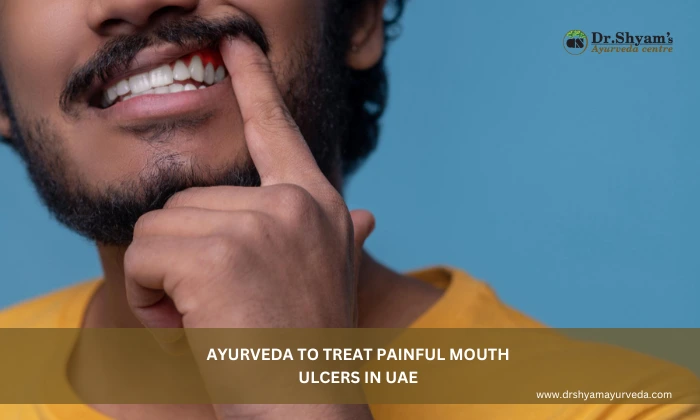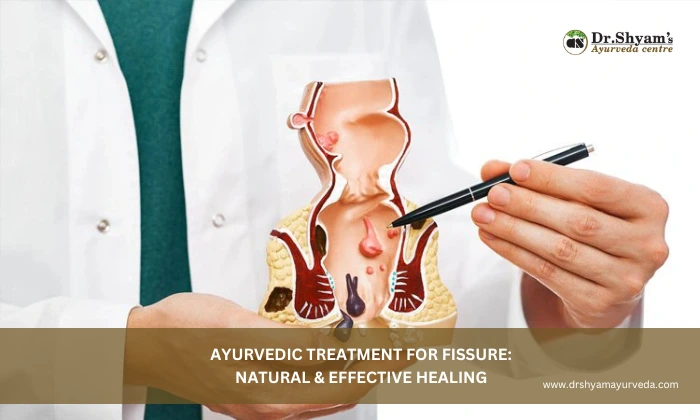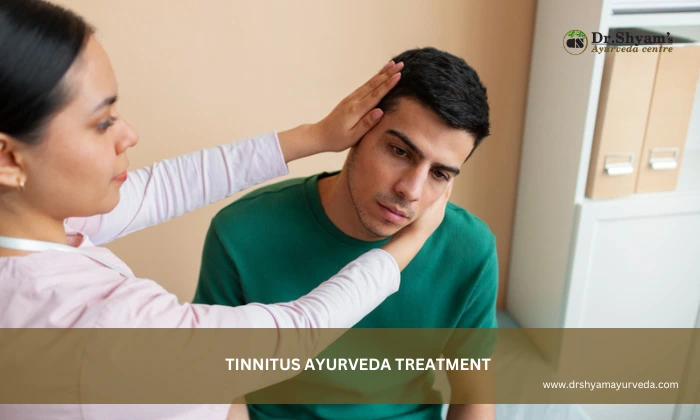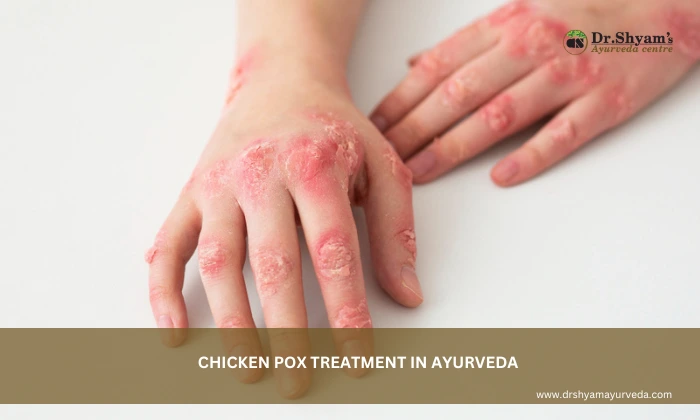Key Takeaways
- Mouth ulcers are painful sores caused by Pitta imbalance, poor oral hygiene, stress, diet, hormonal changes, or infections and may affect multiple areas inside the mouth.
- Ayurveda treats mouth ulcers through Pitta pacification, blood purification, digestive correction, herbal medicines, and therapies, including oil pulling and medicated gargling.
- Quick Ayurvedic remedies include honey, ghee, Mulethi, Triphala, Tulsi, and guava leaves, along with diet and lifestyle changes such as staying hydrated, avoiding spicy foods, maintaining oral hygiene, and managing stress.
- Persistent or worsening ulcers require medical attention, and individuals seeking holistic care can visit Dr. Shyam’s Ayurveda for authentic Ayurvedic and Panchakarma treatment in Dubai.
What is Mouth Ulcers?
Mouth ulcers are sores that can appear anywhere inside the mouth. These small, white-reddish inflamed lesions commonly develop on the mouth’s inner lining. Typically, two to four sores may occur at the same time. While they can be painful, they usually heal on their own and do not lead to complications.
Mouth ulcers commonly occur in the following areas:
- Gums
- Tongue
- Palate
- Inner cheeks
- Inner lips
These sores are often painful and can make eating, drinking, and speaking uncomfortable.
Types of Mouth Ulcers
- Canker sores (Aphthous ulcers) are the most common, appearing as painful white or yellow sores with red borders, often triggered by stress, acidic foods, or minor injury.
- Oral lichen planus causes itchy rashes and lacelike, white sores inside the mouth. It is an immune system response and commonly affects women over 50.
- Leukoplakia forms thick white or gray patches due to cell overgrowth, often linked to smoking or tobacco use.
- Erythroplakia causes red patches, commonly precancerous, also associated with tobacco.
- Oral thrush results from Candida overgrowth, creating red and creamy white patches.
- Mouth cancer may appear as persistent red or white ulcers that don’t heal.
Symptoms of Mouth Ulcers
- Sores on the gums, tongue, inner cheeks, inner lips, or roof of the mouth
- Sores having red edges with a white, yellow, or gray center
- One or multiple ulcers at a time
- Swelling around the ulcers
- Increased soreness while brushing
- Pain that worsens with spicy, salty, or sour foods
Read more: Ayurvedic medicine for tremors
Causes of Mouth Ulcers from an Ayurvedic Perspective
In Ayurveda, mouth ulcers are correlated with the condition Mukhapaka. “Mukha” refers to the mouth, and “Paka” refers to suppuration, ulceration, or maturation. This imbalance aggravates the Pitta dosha and creates excessive heat and inflammation in the body and oral cavity, leading to the formation of painful sores.
Causative factors for mouth ulcers include:
- Poor-fitting dentures or braces
- Improper or disturbed sleep
- Foods that aggravate Pitta dosha
- Excess intake of fried foods
- Improper brushing habits
- Poor oral hygiene
- Stress or anxiety
- Hormonal changes during puberty, pregnancy, or menopause
- Medications, including painkillers and beta-blockers
- Genetic factors
- Bacterial, fungal, or viral infections
- Autoimmune disorders such as Behçet’s disease and lupus
Ayurvedic Treatments and Therapies
Ayurvedic treatment for mouth ulcers focuses on Pitta pacification, blood purification, digestive correction, and tissue healing. For recently developed and mild ulcers, local applications and cooling therapies (Sheetala Dravya Prayoga) are recommended.
Gargling with Panchavalkala Kashaya and performing kavala (oil pulling) with Arimedadi Taila can help manage mouth ulcers. When reduced immunity contributes to ulcer formation, Ayurvedic rejuvenation therapy is advised using formulations such as Chyawanprash, Amalaki Rasayana, and Brahma Rasayana.
Read more: Chickenpox treatment in ayurveda
Quick Ayurvedic Remedies for Mouth Ulcers
Simple and effective Ayurvedic home remedies for mouth ulcers include:
- Apply ghee or coconut oil over the mouth ulcers. This gives a soothing effect and initiates the healing process very quickly.
- Chew tender leaves or fruit buds of guava. The procedure helps reduce pain and accelerates the healing process of mouth ulcers.
- Honey’s cooling and soothing nature helps relieve pain and burning. Honey also has natural antimicrobial and wound-healing properties that prevent bacterial growth and support faster healing.
- Mulethi (Licorice) is especially helpful for ulcers linked to digestive issues. Mulethi helps cleanse the gut and remove impurities that may trigger ulcers.
- Triphala, a combination of three fruits (Amalaki, Bibhitaki, and Haritaki), is known for its antimicrobial and wound-healing properties. It helps combat infection and supports ulcer healing.
- Tulsi (Holy Basil) contains natural analgesic (pain-relieving) properties. Chewing a few tulsi leaves can soothe pain and discomfort caused by mouth ulcers.
Herbal Medicines for Painful Mouth Ulcers
Ayurvedic medicines for mouth ulcers include:
- Chitrakadi Vati
- Avipathi Choornam
- Triphala Kashaya
- Yasthimadhu Choorna and Honey
- Khadiradi Vati
Disclaimer: Always consume Ayurvedic formulations under the guidance of a registered Ayurvedic practitioner.
Read more: Nasal polyps treatment in Ayurveda
Diet and Lifestyle Recommendations
Diet and lifestyle play a significant role in managing and preventing mouth ulcers. The common diet and lifestyle recommendations include:
- Follow a balanced diet: Include a variety of fruits, vegetables, whole grains, and nutrient-rich foods to support overall and oral health. Proper nutrition helps promote faster healing of mouth ulcers.
- Ensure adequate vitamin intake: Vitamins and minerals, including Vitamin C, B-complex, iron, and zinc, are essential for healthy mouth tissues. Add citrus fruits, leafy greens, nuts, seeds, and lean meats to the meals.
- Maintain good oral hygiene: Brush twice daily with a soft-bristled toothbrush and rinse thoroughly after meals to prevent irritation and infection.
- Stay hydrated: Drink plenty of water throughout the day to keep the mouth moist and support healing.
- Avoid tobacco and alcohol: Both irritate oral tissues and slow down healing. Avoid smoking and limit alcohol consumption to prevent recurrence.
- Manage stress: Manage stress with yoga and breathing techniques.
- Avoid talking and chewing at the same time.
- Avoid spicy, acidic, or very hot foods and drinks that can irritate the sore.
Read more: Ayurvedic treatment for hyperhidrosis
When to Consult an Ayurvedic Doctor
Seek medical advice if a mouth ulcer:
- Lasts longer than 3 weeks.
- Appears unusually large or in a new location, such as near the back of the throat.
- Starts bleeding, becomes more painful, or turns red, indicating a possible infection.
Though most mouth ulcers are harmless, persistent ulcers may indicate a more serious condition.
Consult an Ayurvedic doctor if you also experience:
- Ulcers on other parts of the body, such as the skin or genitals
- Painful, swollen, or inflamed joints
Conclusion
Mouth ulcers may seem like a minor problem, but recurrent or painful ulcers signal an internal imbalance that needs holistic healing. Ayurveda offers a safe and effective approach by addressing the root causes, including Pitta aggravation, digestive issues, weakened immunity, and lifestyle factors. With personalized herbal medicines, dietary guidance, and rejuvenation therapies, individuals can experience long-term relief and improved oral health.
If you are searching for authentic Ayurvedic treatment in Dubai or wish to experience specialized Panchakarma treatment in Dubai, visit Dr. Shyam’s Ayurveda. Our expert Ayurvedic doctors provide customized treatment plans for mouth ulcers and other chronic conditions, helping you restore balance naturally and safely.
Book your consultation today and begin your journey to lasting healing
FAQs
1. What is the best medicine for mouth ulcers?
Ayurvedic medicines for mouth ulcers include Chitrakadi Vati, Avipathi Choornam, Triphala Kashaya, Yasthimadhu Choorna with honey, and Khadiradi Vati. These formulations help balance Pitta, purify the blood, and promote healing. They should always be taken under the guidance of a registered Ayurvedic practitioner.
2. Can ghee help in healing mouth ulcers?
Yes, applying ghee directly on the ulcer soothes burning and reduces pain. Ghee acts as a natural coolant and promotes quick tissue repair. It is one of the simplest and most effective home remedies in Ayurveda.
3. How long does it take for Ayurvedic remedies to heal ulcers?
Mild ulcers may heal within 3 to 7 days with proper diet, herbal remedies, and local applications. Chronic or recurrent ulcers may take longer, depending on digestive health and immunity. Ayurvedic treatment focuses on correcting the root cause, so healing may be gradual but long-lasting.
4. Are mouth ulcers contagious?
No, most common mouth ulcers, such as canker sores, are not contagious. They do not spread through saliva or contact. However, ulcers caused by infections like oral thrush have an infectious component, but the ulcer itself is not contagious.
5. Which foods should be avoided to prevent mouth ulcers?
Avoid spicy, acidic, fried, and very hot foods and items that aggravate Pitta dosha. Tobacco and alcohol also irritate the mouth and delay healing. Maintaining a balanced diet with adequate vitamins helps prevent recurrence.
6. How does Ayurveda treat recurrent ulcers naturally?
Ayurveda manages recurrent ulcers by pacifying excess Pitta, improving digestion, and strengthening immunity. Therapies include herbal medicines, oil pulling, medicated gargling, and rejuvenation formulations like Chyawanprash. Diet and lifestyle modifications are also essential for long-term relief.
7. Can stress cause mouth ulcers, and how can it be managed?
Yes, stress and anxiety are recognized triggers for mouth ulcers in Ayurveda. Stress aggravates Pitta and weakens immunity, making ulcers more likely. Yoga, breathing exercises, and proper sleep help prevent stress-induced ulcers.
8. Are there specific mudras for mouth ulcer relief?
Ayurveda recommends practices that balance Pitta and calm the mind. Mudras like Apana Mudra and Prana Mudra may support healing by improving digestion and immunity. They should be used along with proper Ayurvedic treatment for best results.











